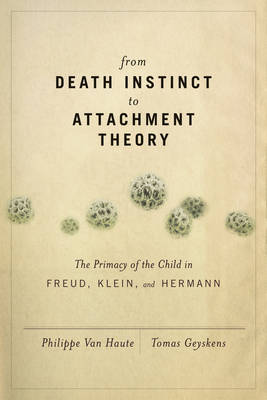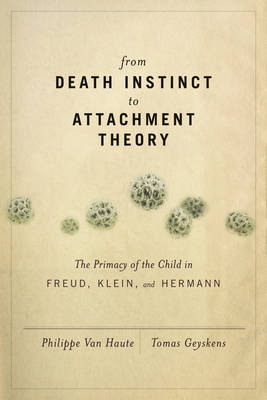
- Retrait gratuit dans votre magasin Club
- 7.000.000 titres dans notre catalogue
- Payer en toute sécurité
- Toujours un magasin près de chez vous
- Retrait gratuit dans votre magasin Club
- 7.000.0000 titres dans notre catalogue
- Payer en toute sécurité
- Toujours un magasin près de chez vous
35,95 €
+ 71 points
Description
Two leading psychoanalysts resolve the conflict between attachment theory and trauma theory. In From Death Instinct to Attachment Theory, Tomas Geyskens and Philippe Van Haute address a theoretical conflict at the heart of contemporary psychoanalysis. Analytic theory, especially the work of Melanie Klein, asserts the developmental primacy of infantile Hilflosigkeit and the trauma it inevitably inflicts; however, John Bowlby and other attachment theorists have shown that attachment to the mother is primary and instinctive--and not the result of traumatic helplessness. Geyskens and Van Haute resolve the apparent tension between the empirical fact of the primacy of attachment and the fundamental psychoanalytic theory of infantile trauma by drawing on Imre Hermann's distinction between natural development and subjective history. Arguing that Hermann's theory constitutes a workable clinical anthropology of attachment, they undertake a deep and revealing analysis of the work of Freud and Klein on the death instinct, trauma, and infantile sexuality; the critique leveled by attachment theorists like Bowlby; and the overlooked insights of the Hungarian School of Psychoanalysis. From Death Instinct to Attachment Theory offers an elegant answer to an important problem in psychoanalysis and provides new insight into the sort of clinical phenomena that led Freud to move beyond the pleasure principle in the first place.
Spécifications
Parties prenantes
- Auteur(s) :
- Editeur:
Contenu
- Nombre de pages :
- 160
- Langue:
- Anglais
Caractéristiques
- EAN:
- 9781590511527
- Date de parution :
- 01-08-07
- Format:
- Livre broché
- Format numérique:
- Trade paperback (VS)
- Dimensions :
- 156 mm x 225 mm
- Poids :
- 285 g

Les avis
Nous publions uniquement les avis qui respectent les conditions requises. Consultez nos conditions pour les avis.






